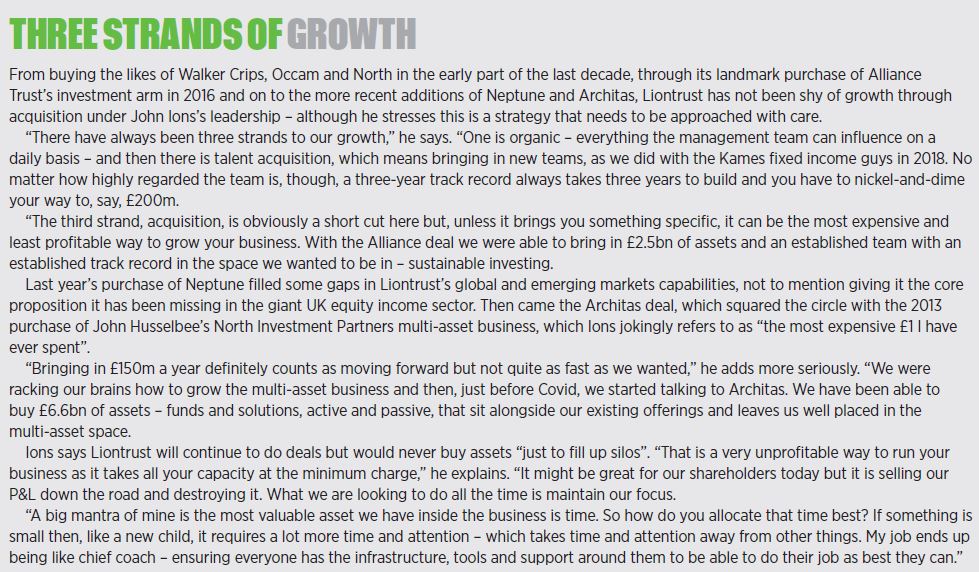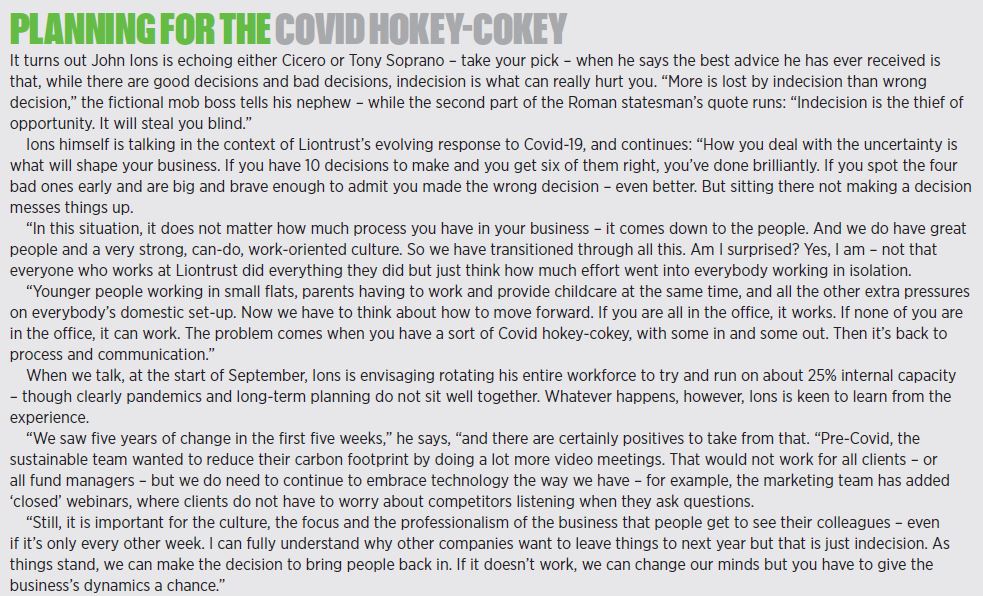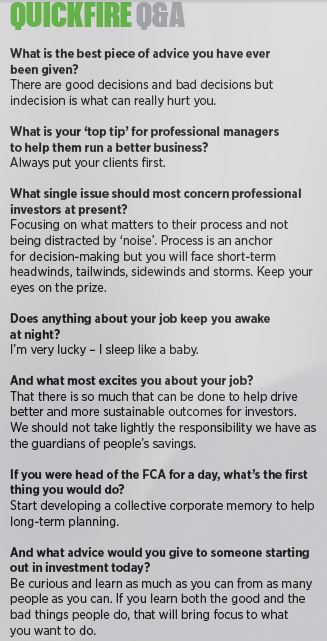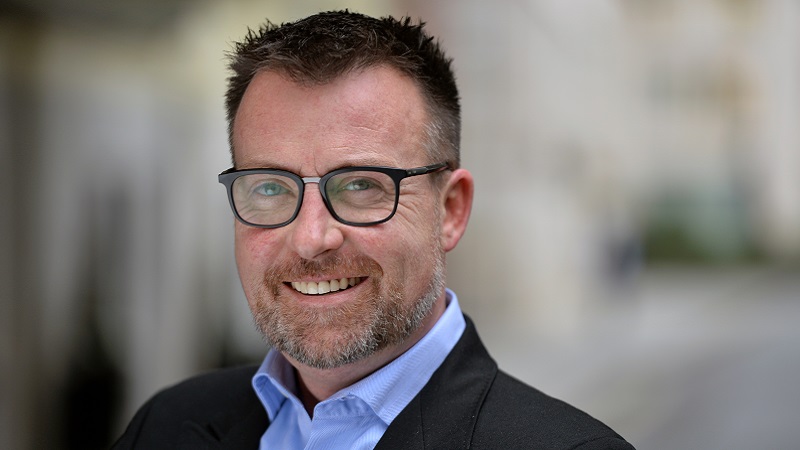“Liontrust – why bother?” John Ions is recalling what an industry acquaintance asked him – “No ‘Hello. How are you? Welcome to the party’” – shortly after he joined the company in early 2010, briefly as head of retail before taking on the chief executive role he still holds today. As he does so, I feel a wince of recognition – I fear my own, equally abrupt, observation to him around that time was: “I think you’ve made a big mistake.”
In my defence, Liontrust was still going through what Ions himself describes as “the shock and awe” that followed the departure a year earlier of star managers Jeremy Lang and William Pattisson. Given they had run, well, the lion’s share of the company’s assets, it seems unlikely only two of us were doubting Ions’s latest career move after senior roles at Aberdeen Asset Management, SG Asset Management and Tactica Fund Management.
Still, it turns out we were the ones who were mistaken and Ions had obviously seen something worth bothering with. “When I came to Liontrust, we had to quickly address the fact there had been outflows for years, it was losing half a million a month and it had less than £1bn under management,” he says. A decade later, thanks to a combination of organic growth and a very focused shopping list, (see box below), assets are up to £25bn.
“With the Alliance Trust sustainability team, with the global fixed income guys from Kames, with Neptune and now Architas, we are starting to expand out – and a bit more internationally, too,” says Ions. “We have distribution agreements in place in Europe now, so there is plenty of growth, which we will augment with more acquisitions along the way. We have kept the business pretty focused.”

‘Focus’ crops up a lot in the conversation – occasionally in the guise of ‘holding the line’, ‘sticking to a plan’ or ‘eyes on the prize’ – and a lot of it relates to clients, both existing and potential.
“The asset management industry was built on telling people what they should own,” says Ions. “Funds were sold, not bought, but who is the most important person in the chain here? “It’s not the fund manager or adviser, it’s the end-consumer.
“The big shift over the past 10 years – and one that is going to continue – is that the successful companies will be those that deliver what clients want. It doesn’t matter what industry you are in – any business that does not put its clients at the centre of its proposition is going to fail.” Communication is key is achieving this at Liontrust, Ions believes – both the message itself and how it is delivered.
Technology is redundant if you are not creating the right content
“Technology can give us closer proximity here – more feedback, more intimacy, more immediacy – and asset managers have been filling up on data,” Ions continues. “Often, though, their data sits on lots of different systems and those systems do not talk to each other. So, over the past 10 years, we have spent a lot of time, money and effort getting all our systems to work together so we can analyse the data properly.
“Of course, the technology is pretty much redundant if you are not creating the right kind of content – things people can engage with – and the classic example here is sustainable investment.
“We know our level of engagement with clients is significantly higher here than it is with other areas we offer. Climate change, cleaner energy, better quality of life – these are all big investment drivers going forward.”
Nor is Ions thinking solely about his company’s current client base.
“If you are looking for new investors, how do you engage with them?” he asks. “Sustainability has obviously been something people want to know more about. Go back four years, when we were doing the Alliance deal, and people were asking where sustainability fitted in – suggesting clients really weren’t ‘demanding’ it.
“But at what point were clients being given that chance? After all the risk-profiling and everything else is done or right at the start of the process? Because if you ask people at the start if they want their money invested in a sustainable way, you won’t get many who say, well, actually I was after the smoking, violence and pollution investment option.
“Asset management has an important part to play here – and it needs to be seen to be playing it – because, after all, what are we? We are the guardians of people’s savings.
“For an industry that basically deploys the capital that underpins businesses, jobs and the economy, how do we manage to end up with such a bad rap?
“We are starting off with a good thing – providing a huge social benefit – but we need to set out our credentials a lot better.”
This industry has made things really complicated for savers
Unfortunately, suggests Ions, too often asset management groups are not even setting out their credentials in the same language their clients speak. “For years, this industry has acted like the Catholic church in the Middle Ages, maintaining control by conducting services in Latin,” he says. “For our part, we have specialised in three-letter acronyms or making things really complicated for savers and investors.
“The liberalisation of the pensions market was supposed to put more power into people’s hands but it will take time. Eventually, though, £25 or £50 a month into your pension becomes £10,000 or £25,000 and you start thinking harder about it. People don’t have to be experts but they are perfectly capable of reading the financial pages and deciding who they want to run their money or asking the question of an adviser.
“Yet the industry is still overcomplicating things. I understand we are dealing with people’s money here but we have got to be able to offer very simple savings products. If I look at the sustainable funds we run, for example, there has been huge demand for what are, effectively, the old ‘cautious’, ‘balanced’ and ‘growth’ portfolios that were being bought 30-odd years ago.
“There has been a mass wave of that through the broader part of the intermediary market and it is very much people who wants to start saving into Isas but want to align those savings with their own personal objectives of a cleaner, healthier, more sustainable world. So we need to find better levels and ways to get the message out to people. Technology can help but, if you have not got decent content there will be no engagement.”
Ions suggests one layer of complexity stems from a fixation on price over value for money – an issue he does not expect to be wholly addressed by the value assessments groups must now produce.
“There is too great a focus on driving costs down across the board,” he says. “That is not to say companies should be allowed to charge what they like but the regulator is using a hammer to crack a nut.
“Some big, successful businesses have been consistently expensive but that is because they deliver what their clients want. If they stopped delivering, they would have to change their pricing or else noone would ever use them.” As such, argues Ions, asset managers and regulators alike should spend more time looking at other reasons why more people might not save – and then decide how best to promote what the sector has to offer.
Value is all about the quality of service delivered
A better understanding all round of what constitutes value for money could help, he suggests, explaining: “Value for money is the quality of the service provided. Financial or investment advice is not valued at the time of the decision, or at any single point afterwards, but over the length of that decision. If you make an investment decision now, it could be five or 10 years before you know if it is right or not.
“We are so caught up in the short-term cost implications but what is the key issue here? It is that more and more people need to be encouraged to save. I always come back to the example of my mother, who is getting nothing on her savings. She cares about her cost of living, not if a fund is top or bottom quartile, so if she could invest in a product that gives a 5% or 6% annual return going forward, what is the right price for that?
“Obviously value is about more than price yet the way a value assessment works is the first screening process is relative to your industry peer group. So, if everybody else is cheaper than you, you look expensive and you start off with a red flag over you – yet there is no way, say, Anthony Cross’s Special Situations Fund would be the size it is if people thought it was poor value.
“On top of that is the way the industry tries to compare active versus passive. If you strip out pure passive and pure added value, you start to identify measurable differences. But the numbers are skewed by a whole load of moribund stodge that sits in the middle ground – predominantly captive assets that have come in through banks, insurance companies and default propositions.”

How the industry can salvage its reputation
Looking to the future, though, Ions believes the UK asset management sector still has the luxury of holding its fate in its own hands.
“Even in a worst-case scenario of a protracted recession, the industry can still live up to its vitally important role of deploying the capital that enables the economy to function – channelling assets towards areas of future growth and sustainable job creation,” he says.
“And if that gets us to think about different or longer-term types of investment product, so much the better. At the same time, the best-case scenario still has the industry embracing this role and then enhancing it – looking out at the wider world and its impact on that and then thinking about what it can do to help create opportunities for others – for example, with maths and education on a more national scale.
“This sector touches just about every aspect of society and, while it does not have a great reputation from that point of view, this is its own opportunity to rehabilitate its image.
“That is the exciting bit and it comes back to focus – what are you trying to do and how do you deploy your assets? Don’t try to be too clever. Don’t come up with a proliferation of new products. Just test everything you do and ensure it is continually fit for purpose.”












